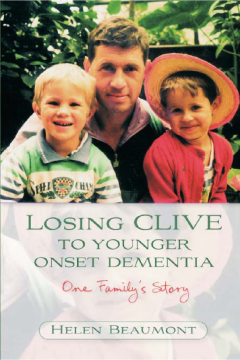
Additional Information
Book Details
Abstract
Clive Beaumont was diagnosed with Younger Onset Dementia at age 45, when his children were aged just 3 and 4. He had become less and less able to do his job properly and had been made redundant from the Army the year before.
Clive's wife, Helen, tells of how she and the rest of the family made it through the next six years until Clive died: the challenge of continually adapting to his progressive deterioration; having to address the legal implications of the illness; applying for benefit payments; finding nursing homes; and juggling her responsibilities as a wife, a mother and an employee. She also describes the successful founding and development of The Clive Project, a registered charity set up by Helen and others in a bid to establish support services for people with Younger Onset Dementia.
Younger Onset Dementia is comparatively rare, but not that rare. This story is for the family and friends of people with the condition, for the people themselves, and for the professionals working with them.
Helen Beaumont is a founder member of The Clive Project (www.thecliveproject.org.uk), a registered charity based in Oxfordshire and named after her husband. She lives in Oxfordshire with her two children.
This book is as engaging and enlightening as it is poignant and tragic, I personally could not put it down, I was so drawn to the heady mixture of its compelling human story, coupled with an easy, conversational readability. This book belongs to the burgeoning genre in mental health writing of client/user (or in this case, carer) narrative, and adds in no little way to that body of authority, especially covering the much less heralded arena (both clinically and in terms of publicity) of younger onset dementia.
Mental Health Nursing
Clive's wife Helen lays bare each raw aspect of her husband's condition and treatment: the tardy arrival of a proper diagnosis, the way Clive was shedding his life skills just as their children were acquiring theirs, the bewildering prejudices of the benefits system and the grief of having to find long-term care for him outside the home.
Heartfelt, yet unsentimental, the result is a rare and illuminating account of trying to live and cope with this shattering condition.
For anyone trying to understand the problems of dementia in younger people, this excellent book should be the first thing on their reading list.
Nursing Standard
Table of Contents
| Section Title | Page | Action | Price |
|---|---|---|---|
| Introduction | |||
| Chapter I | |||
| Popular Education in Latin America | |||
| Chapter 2 | |||
| The Work of Paulo Freire | |||
| Chapter 3 | |||
| The Methodology of Popular Education | |||
| Chapter 4 | |||
| Popular Education and the Landless People's Movement in Brazil {the 'MST') | |||
| Chapter 5 | |||
| Popular Education and the Politics of Identity | |||
| Chapter 6 | |||
| Popular Education and Ideology | |||
| Chapter 7 | |||
| Assessing the Impact of Popular Education at Micro Level | |||
| Chapter 8 | |||
| Assessing the Impact of Popular Education at Macro Level | |||
| Chapter 9 | |||
| 'Rethinking the Basics' of Popular Education: | |||
| Conclusion |
